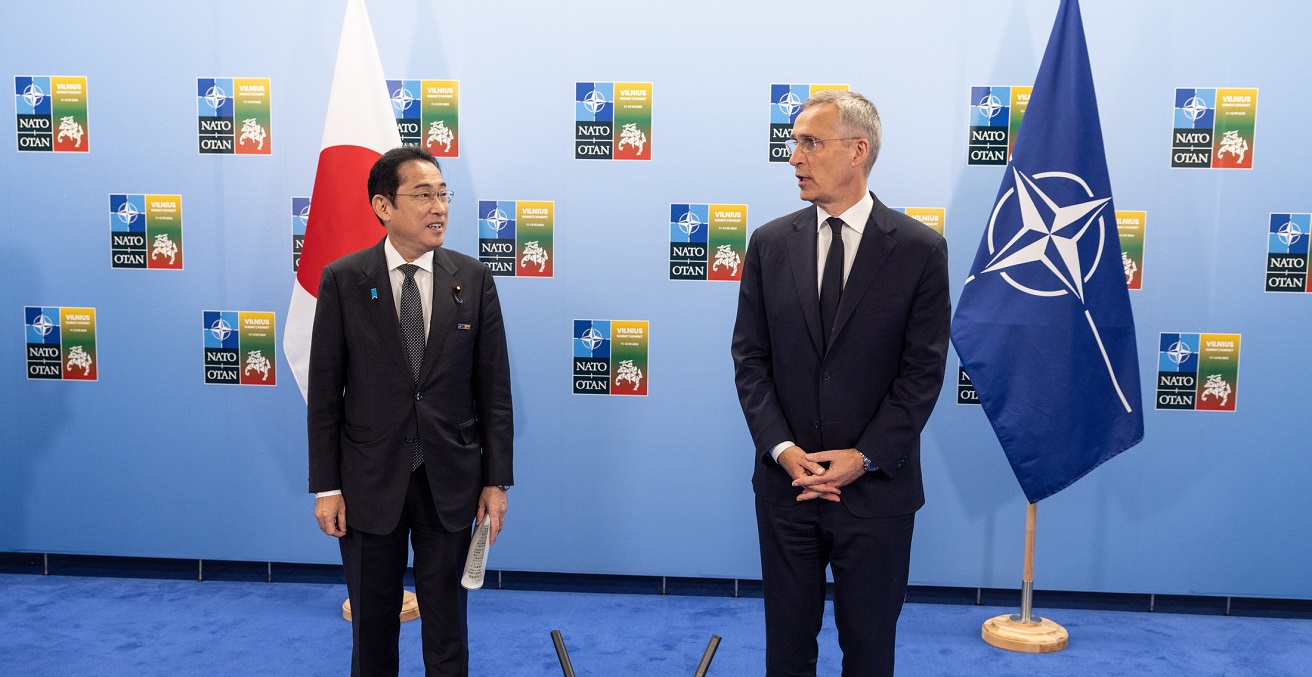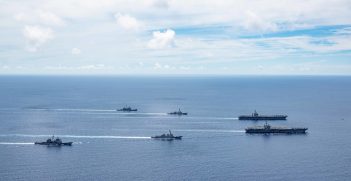NATO in the Indo-Pacific and the French Position: Post Vilnius Summit

France’s position on NATO’s proffered Japan office is likely much more nuanced than given credit. While there would be great benefit for NATO partners in the Indo-Pacific of an active NATO presence, this would create its own set of difficult challenges for members, as their support for Ukraine illustrates.
The recent summit of the North Atlantic Treaty Organisation (NATO), which was held in Lithuania’s capital Vilnius on 11 and 12 July 2023, reignited debates about the alliance’s possible expanded role in Indo-Pacific strategic affairs.
These debates were triggered by the following considerations. First, the factor of the Indo-Pacific featured in the 90-point long official communique, which was released on Day One of the summit, though the main focus was predictably on the war in and over Ukraine as well as Russia’s aggressive behavior in Europe.
“The Indo-Pacific is important for NATO, given that developments in that region can directly affect Euro-Atlantic security,” point 85 of the Communique states. There were more specific referrals to China, the Democratic People’s Republic of Korea, and the broader Indo-Pacific strategic agenda as additional points of concern.
Second, the Vilnius summit saw a presence of the so-called Indo-Pacific Four (IP4) group (Australia, Japan, New Zealand, and the Republic of Korea), NATO’s core allied partners in the region. This added more Indo-Pacific flavor to the summit’s agenda and deliberations.
Furthermore, the declared purpose of NATO’s mission in Japan (another point of deliberation at the summit) was to enhance security and defence dialogue with the IP4 group, including Australia.
Third, France’s vocal opposition to the opening of the alliance’s office in Tokyo caused controversy and added more discussion points for future deliberations. The proposal itself is neither new nor coincidental. The initial consultations on this matter took place back in January 2007 during the then Japanese Prime Minister Abe Shinzō’s visit to NATO’s headquarters in Belgium, though no public announcements were made at a time. Eleven years later, Tokyo has furthered its relations with the alliance after opening its official mission in Brussels.
But Paris’s thump down approach put a stopper to a recipient step, at least for now.
“Big Mistake” or “Deference toward China”?
The official position of Paris was made clear by the French president Emmanuel Macron back in early June 2023 when The Financial Times quoted him, remarking that “If… we push NATO to enlarge the spectrum and the geography, we will make a big mistake.”
During the summit, members of the French delegation continued to argue against the proposal, though in a more discreet manner. “NATO [stands for] north Atlantic, and both article V and article VI [in its statutes] clearly limit the scope to north Atlantic… “There is no NATO liaison office in any country in the region. If NATO needs situational awareness in the region it can use the embassies designated as point of contact,”” an anonymous French official said.
Japan’s reaction was predictably negative. One media source argued that “France is showing significant deference toward China.”
It may seem that France under Macron is soft cushioning its policy towards China on the grounds of advocating for Europe’s “strategic autonomy,” something that sparked controversy during his April official visit to Beijing.
France’s non-involvement in the Quad (Quadrilateral Security Dialogue) and AUKUS security agreements contribute to Beijing’s willingness to seek a more positive agenda with Paris, which is important to Macron, also because of economic considerations.
However, his opposition to a mission in Tokyo is likely less about appeasing the Chinese and more about understanding the potential complexities of NATO’s actual involvement in the region. It most likely factors in potential problems the alliance might encounter while committing to the Indo-Pacific, detailed more below.
NATO in the Indo-Pacific? Wants versus Means
Despite the tyranny of distance between the Indo-Pacific and Europe, NATO can carve out an important role, not so much in stabilising the regional balance but in aiding its IP4 partners as well as supporting the US.
There are several pull and push factors that support NATO’s growing appreciation of the Indo-Pacific’s geo-strategic context. One of the most obvious pull factors is the physical presence of three NATO member-states in the Indo-Pacific: France (island territories in the Indian Ocean and southern Pacific), the US, and the United Kingdom (largely Diego Garcia).
The second is Europe’s dependence on critical sea lines of communications, including as global enabler to connect with Asia’s economies and markets.
Key push factors (reflected in the Vilnius communique) are China’s attempts to alter the international rules-based order; Beijing’s strategic convergence with Moscow; the need to enforce and maintain a favourable maritime security regime; the North Korean nuclear-missile program; and cyber and hybrid risks.
A deeper involvement of the world’s largest defence alliance with a global reach capability, which includes three nuclear-armed states (the US, UK, and France) could be a strategic game changer for the Indo-Pacific.
But when it comes to practical implementation, the reality differs from expectations. There is little doubt that NATO can assist regional players with some capability development and force training. Information and intelligence sharing is another avenue, though all of above already exists in some form.
Beyond that, the alliance faces more serious obstacles. The first challenge rests with the strategic philosophy of the alliance, which was created to defend Europe against the Soviet threat, and to uphold the pivotal Transatlantic connection with its principal security guarantor, the United States.
A deeper engagement in the Indo-Pacific on a sustained basis requires a recalibration of NATO’s Europe- and Atlantic-focused operational strategy and its very strategic philosophy, which focuses on the “north Atlantic.”
NATO will also have to think carefully about being potentially stretched, if committed to two major strategic theatres (European and the Indo-Pacific).
Russia’s strategic threat to Europe will continue to dominate the alliance’s agenda for the medium-term future as well as draw on all its available resources. The war in and over Ukraine has exposed the resource limitations of the world’s largest alliance, which was manifested in scrambles to supply Kyiv with sufficient munitions, main battle tanks, and armoured vehicles.
Consequently, NATO would struggle to commit considerable assets to any potential contingencies in the Indo-Pacific, including in support of any containment game against China. Occasional deployments of warships to the Indian Ocean and the South China and East China Seas by European navies carry more symbolism than a game changing affect. Ironically, the need for a more meaningful naval presence was recognised by Chief of the French navy.
These considerations are likely breed further reluctance in Brussels, fearful of being drawn into any further political-military crisis in the region, as openly stated by one of Europe’s top security and defence bureaucrats, Christoph Heusgen, who is the Chairman of Munich’s annual security conference: “…when it comes to active involvement of NATO in possible conflict situations (in the Indo-Pacific), this is by definition excluded in the treaty,” he said back in May.
Perhaps, Macron’s opposition to NATO’s mission in the Indo-Pacific is more a reflection of sober reality rather than an attempt to appease the Chinese, even though his critics are likely to believe the latter. One way or another, France’s future position on the matter will be pivotal to the alliance’s future consensus. After all, it is one of NATO’s core European member-states and a nuclear-armed nation that has a physical presence in the region. Macron understands it too well, hence his hard ball tactics.
Dr Alexey D Muraviev is Associate Professor of National Security and Strategic Studies at Curtin University in Perth.
This article is published under a Creative Commons License and may be republished with attribution.





